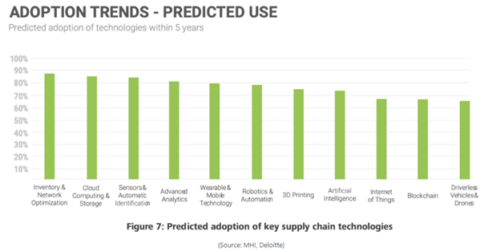Last week’s ProMat 2023 conference in Chicago saw the release of the industry’s annual report card examining executives’ opinions on top challenges within supply chain management. It revealed that finding and retaining qualified workers stands tall as an exceptional struggle for those involved in this field.
Supply chain leaders around the world are expected to ramp up their investments in technology next year, according to a report published by trade group MHI and consultancy Deloitte. The survey of over two thousand respondents found that 74% plan to increase spending on technological solutions compared with 2022 – an impressive 90% intend to spend 24% more than the prior year, while 36% committed to a 19% increase.
The report revealed that much of these investments will be aimed at producing high-performance jobs in an effort to appeal to newcomers to the sector.
Businesses are investing big in IT, and their primary focus over the next five years is projected to be on inventory optimization and network systems. According to a recent report, 87% of surveyed organizations expect considerable increases in spending for these domains while cloud computing storage, sensors & automatic identification technologies as well as advanced analytics will also see major investments soon.
Companies are investing in emerging tech to reduce manual labor, upgrade their supply chain operations and create more desirable jobs for skilled workers. A recent report titled “The Responsible Supply Chain,” noted that the next five years will see a substantial uptick of 11 different types of technology adoption – giving businesses an opportunity to upskill employees while offering attractive career paths with higher rewards.

The report revealed that transportation companies are proactively preparing themselves for the future of work – 41% are investing in reskilling and upskilling labor to support emerging technologies, 34% have launched initiatives targeting unique skill sets that will be essential down the line, while 27 % seek to create an innovative mindset within their organizations.
Businesses are rethinking their approach to the supply chain, with many turning away from traditional partnerships and instead looking for new ways of doing business. Findings from the report reveal organizations plan to either team up with vendors or develop and test their own tech solutions as disruption becomes an increasingly regular occurrence. This shift towards more collaboration, along with increased data-sharing capabilities is being driven by recent global shocks seen across key industries such as manufacturing and retail.
With environmental concerns rising, the pressure for organizations to reduce their scope 3 emissions is higher than ever, yet only 23% of respondents listed compliance in this area as a high-priority focus – leaving stakeholders often pushing for more tangible progress in organizations’ efforts to combat climate change.
According to the report, the sustainability focus is shifting towards electrification and beyond, with autonomous, connected and intelligent supply chains emerging as the top priority. It has been predicted that by 2027 that network of digital supply chain solutions will be commonplace, delivering complete transparency in planning operations around the globe on an unprecedented level.
“This means a future where companies have invested in digital transformation will see increased speed, connectivity and transparency” and will be “certain to benefit from data that is accurate, shareable, secure and actionable,” the report predicted.
Source: FreightWaves








